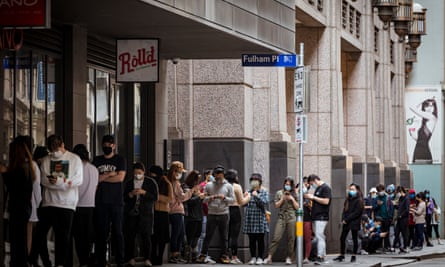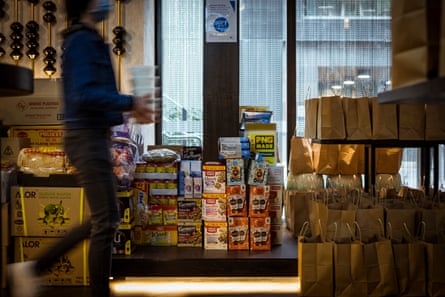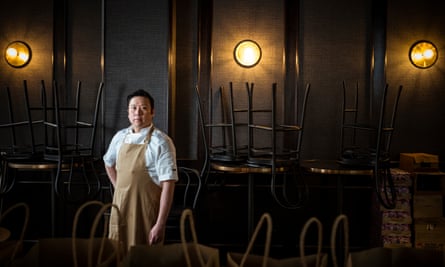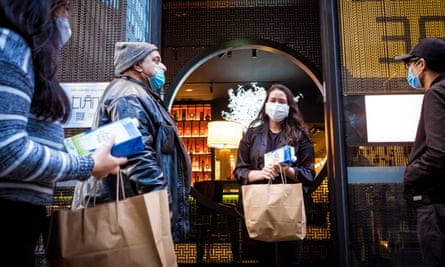Extract from The Guardian

Brutal consequences of government decision to exclude temporary visa holders from jobseeker and jobkeeper laid bare
Last modified on Thu 17 Sep 2020 03.56 AEST
Scott Morrison had a simple message for more than one million international students and temporary visa holders in Australia when Covid came: it was “time to make your way home”.
For some, it wasn’t so simple.
As the queues at foodbanks have grown, universities and state and local governments have cobbled together support packages to meet the rapidly increasing need.
But the federal government remained resolute. When the jobseeker and jobkeeper packages were unveiled, visa holders were left out.
Now a comprehensive survey of 6,000 international students and other visa holders lays bare the brutal consequences of that decision.
“Beyond the statistics, the survey revealed a deep sense of social exclusion among temporary migrants that is going to have a significant impact on Australia’s global reputation,” says the co-lead researcher, Associate Prof Laurie Berg, of the Migrant Worker Justice Initiative.
“Thousands used open responses in the survey to express their anger and distress at the government’s policies and hundreds specifically mentioned the prime minister’s message to them.”
The joint project from the University of New South Wales and the University of Technology Sydney finds some visa holders were unable to heed Morrison’s call to go home even if they wanted to.
One in five say flights home were unavailable, 19% say the borders of their country or key transit areas were closed and a quarter couldn’t afford the inflated ticket prices.
As the pandemic worsened, income sources dried up. With many working in heavily casualised industries, the survey finds 70% of respondents lost their job or saw most of their hours cut.
Meanwhile, a
third weren’t able to afford essentials because their family back home
could no longer support them at the same level.
The result is 51% say they now have a debt they can’t cover, 28% have been unable to afford food at some point and 14% report experiencing some type of homelessness.
Berg says the July survey also finds one in three students were expecting to run out of money the following month.
“It’s not the case that we’re out of the worst of this,” she says.
Students turn to food banks
Government data shows despite the prime minister’s message, there were still 524,000 international students in Australia last month, meaning four out of five have stayed.
For them, the government temporarily removed rules limiting students from working more than 20 hours a week and allowed visa holders to access their superannuation.
Berg says some students were grateful for the super scheme, but others went on to discover “their employers actually hadn’t paid those contributions and so they were not able to access anything”. From July, the super access scheme was closed for temporary visa holders.
Increased employment rights were of little benefit to those who couldn’t find or keep a job.
"If a person at the highest position makes us feel unwelcome, you can imagine the feelings of most Aussie people towards international students"
Tiyon, 43, is studying a $35,000-a-year accounting and financial management masters course and lives in Melbourne’s outer north with his wife, Fitri, and their two children, aged 12 and 22 months.
The Indonesian couple have been working as cleaners and Fitri’s full-time hours provide the bulk of the family’s income. “After the pandemic, we had a big issue because my wife lost her job,” Tiyon says.
He is working part-time while studying but the money is “still not enough”.
Like the one in six students surveyed, Tiyon has received emergency food relief, from a local Indonesian community group known as the Kasih Project. He’s also sought help from Foodbank and the Red Cross.
“With the charities, they send groceries, daily food, it’s very helpful for my family,” he says. “I got some food from Foodbank from my daughter’s primary school. They support us weekly. I think the important thing is that I can support my baby. It’s more crucial than us adults.”
Brunei-born
Alan Chong, 39, has seen the queues of people lining up for a free meal
at his Melbourne CBD restaurant grow each week.
Two months ago the owner of Tiān38 posted on social media offering a free meal. He set aside 30 meals, but 60 people turned up. Chong expects 200 this week. Most will be young, in their late teens or early 20s.
“Living in Australia for 35 years now, food security was never something I could fathom would cross my thoughts,” he says.
He is scathing about the lack of access to the jobkeeper wage subsidy. “I’ve had a couple of staff that were on temporary visas … unfortunately I had to let them go,” he says. “Personally I felt that was a consequence but also a failure on my behalf because the structures weren’t there to support them and keep their employment going on.”
When asked about the design of jobkeeper, ministers say the government had to “draw the line somewhere”.

The government also notes prospective international students must confirm they will be able to support themselves financially when applying for a visa.
“I think it isn’t well appreciated in the Australian community that the UK, Ireland, Canada and New Zealand have all extended wage subsidies and, in many cases, other supports to temporary visa holders,” Berg says.
“Australia really is a global outlier in this callous treatment of temporary visa holders. That was also mentioned in quite a number of responses. They’re aware they chose Australia over other viable options as a study destination and they’re aware other countries have behaved quite differently.”
‘Time to make your way home’
The report surveyed 5,000 international students and about 1,000 people on temporary work or humanitarian visas. About 40% were from either China or India, while 7% were Nepalese.
More than 1,500 used the open responses to detail the racism they had experienced during the pandemic.
The researchers say 23% of respondents have experienced verbal abuse, but that rose to 35% for Chinese respondents. People of an east Asian or south-east Asian background were most likely to have experienced racism, followed by those from south Asian countries.
In one case, a Chinese woman told the survey “a stranger shouted in my face that I am the virus in the supermarket”.
“Many had been treated as though they were infected with Covid themselves because they were of Asian appearance,” Berg says. “In some cases [they were] describing physical attacks, whether they were shoved or pushed or spat or coughed on deliberately.”
There was also fury over the prime minister’s early April remark that it was time to head home.
Berg says some respondents described themselves as “the ATMs of the Australian government”. Others felt like “aliens that didn’t belong here or inanimate objects or garbage”.
One person told the survey: “If a person at the highest position makes us feel unwelcome, you can imagine the feelings of most Aussie people towards international students.”
Since June, the government has been drawing up plans to allow for the return of overseas students, one of Australia’s largest exports. However, the outlook is uncertain, particularly for those in Victoria like Tiyon.
He says he didn’t want to return home without his degree or uproot his daughter’s life. She’s enjoying grade six at a school in Melbourne. “I think it’s better to wait and stay here,” he says. “Maybe the situation will come back to normal again.”
No comments:
Post a Comment